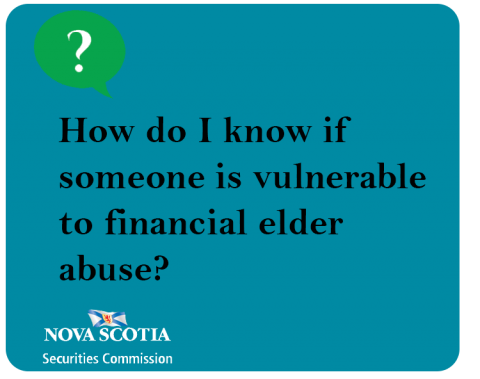Submitted by nsscadmin on

Someone being older is not the only thing that makes them vulnerable to financial elder abuse. There are certain signs and life changes that can make someone more susceptible to abuse.
They are socially isolated, depressed, or lonely. Someone who is isolated can be vulnerable to financial elder abuse because there is no one around to see the effect abuse might have. Someone depressed or lonely may also be more susceptible to a scam artist who preys on these feelings.
They have experienced a change in their ability for self-care. If someone can no longer look after themselves, they can become vulnerable to someone taking advantage of their dependence. For example, if you are no longer able to pay your bills yourself and rely on someone to do it for you, it leaves you vulnerable to theft.
They depend on someone to provide everyday care. As we said above, when you rely on someone else for your care it leaves you vulnerable to being taken advantage of. Make sure someone you implicitly trust is your caretaker.
They have given power of attorney to someone to manage their finances. Many people hand over control of their finances to someone else when they get older only to find out later that this person has cheated them and stolen some or all their money. If you do have someone in charge of your finances, make sure there is some oversight whether it’s another person, your bank or adviser.
They are uncomfortable with the person providing care. Not being able to trust the person caring for you makes you vulnerable to abuse.
They have just lost a loved one. Someone that has just lost a loved one may be vulnerable to financial elder abuse for a number of reasons. Maybe their spouse was the one that handled all the finances. Maybe the loss has left them isolated or depressed. Maybe the loss will deprive them of a previous income, leaving them in a whole new financial position.
They have cognitive issues or other health issues. Older people with cognitive issues have been taken advantage of by their spouses, children, advisers, and caregivers. Often this abuse is never found, or even if it is, it’s too late to get back money that has been spent or stolen.
